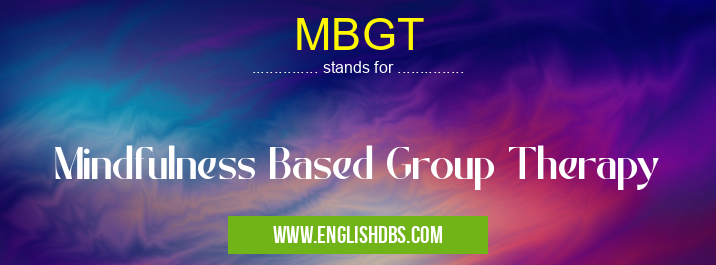What does MBGT mean in THERAPY
Mindfulness Based Group Therapy, or MBGT, is an innovative approach to mental health care that incorporates evidence-based mindfulness practices into the therapeutic process. This type of therapy is designed to support individuals in developing healthier relationships with themselves and their environment in order to cultivate greater wellbeing and resilience. Through experiential activities, mindful awareness exercises, and supportive group dialogue, participants can more deeply explore areas of difficulty while expressing their unique experience with a greater understanding of themselves.

MBGT meaning in Therapy in Medical
MBGT mostly used in an acronym Therapy in Category Medical that means Mindfulness Based Group Therapy
Shorthand: MBGT,
Full Form: Mindfulness Based Group Therapy
For more information of "Mindfulness Based Group Therapy", see the section below.
What is Mindfulness Based Group Therapy
MBGT focuses on developing the core skills of self-awareness and self-regulation, allowing people to gain insight into how their thoughts, feelings, and behaviors can be shaped by external influences such as stress or trauma. In this way, individuals can learn to work with what arises without getting overwhelmed or re-traumatized by difficult emotions or sensations. Additionally, MBGT encourages the cultivation of connection - with oneself and others - through shared mindful experiences in a safe and supportive group environment. Through mindfulness practices such as body scan meditation, sitting meditation, mindful movement, sharing circles/processes/inquiry groups and other experiential activities; participants are exposed to new ways of being in relation to their internal landscape as well as with each other. Participants are also invited to develop kinder relationships with their inner experience so they can better cope with the challenges life inevitably brings.
Advantages of Mindfulness Based Group Therapy
The primary benefit of MBGT is that it allows members to access tools for greater self-awareness and self-regulation within a supportive group environment. When engaging in mindfulness practices together there is an increased sense of safety that allows for more honest communication among members which can lead to a stronger sense of belonging amongst peers. By creating space for meaningful conversation around lived experiences without judgement or shame we foster psychological safety which allows for deep healing work to occur. Moreover, due to its non-confrontational nature; MBGT offers an accessible modality for those who may have experienced difficulty engaging in traditional talk therapies before. Lastly, because it relies heavily on experiential activities; research indicates that it may be especially effective for those dealing with trauma related issues looking for creative avenues towards recovery.
Essential Questions and Answers on Mindfulness Based Group Therapy in "MEDICAL»THERAPY"
What is Mindfulness-Based Group Therapy?
Mindfulness-Based Group Therapy (MBGT) is an evidence-based group treatment that combines mindfulness practice with traditional psychotherapy approaches. MBGT is designed to cultivate participants' self-awareness, help them develop skills to cope with difficult emotions and life experiences, and foster interpersonal growth.
How does MBGT differ from other forms of psychotherapy?
MBGT differs from other types of psychotherapy in two main ways. First, it incorporates mindfulness practices such as meditation, body scanning, and breathing techniques into the program. Second, it focuses on group process to help participants build meaningful connections with one another and understand the impact their relational dynamics have on their individual well-being.
Who should consider participating in a MBGT?
MBGT can be a beneficial treatment option for individuals suffering from anxiety, depression, or relationship issues. Additionally, people who are seeking support in developing skills needed to manage stress and emotional responses may find this form of therapy helpful.
How long does a typical MBGT session last?
Most standard sessions last about 90 minutes. During this time period, participants will participate in guided mindfulness exercises combined with group activities and psychoeducation about understanding emotions and developing healthy relationships with others.
What type of results can I expect from participating in an MBGT program?
With regular participation in a comprehensive MBGT program participants can expect to gain greater knowledge of themselves, increase self-confidence, improve their ability to cope with stressors in their lives and heighten mindful awareness. Many participants report an overall sense of improved well-being when they complete the course of therapy.
Does insurance cover this type of therapy?
If your insurance provider offers coverage for mental health services then you may be able to use your benefits for this type of therapy depending on your policy's specific coverage criteria. To ensure that you understand what is covered under your plan we recommend contacting your insurer prior to starting any type of therapy service.
What do I need to bring or prepare for my first MBGT session?
The most important thing that you need for each session is an open mind! Additionally some sessions may require you to bring along materials such as a notebook or writing utensil so make sure you check any instructions provided before attending each session.
Can I join an existing group or do I need to start my own?
It is possible to join an existing group if there are openings available otherwise many practitioners offer private sessions which can be tailored specifically to meet your individual needs.
Final Words:
In summary Mindfulness Based Group Therapy provides a powerful toolkit towards cultivating healthier relationships with ourselves while deepening our sense of connection amongst others within a safe and nurturing environment. With its wide variety techniques backed by evidence based research; people from all walks life seeking relief from emotional distress can find important strategies they need along their journey towards peace & wellbeing.
